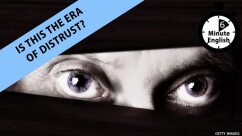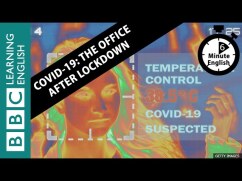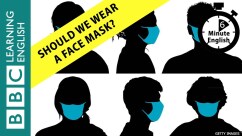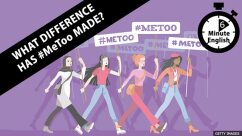LifeInTheModernOffice.pdf
LifeInTheModernOffice.mp3
Sam
Hello. This is 6 Minute English from BBC Learning English. I’m Sam.
Neil
And I’m Neil. Have you seen my pen, Sam? It’s not on my desk.
Sam
No, I haven’t touched your pen, Neil.
Neil
…And someone’s taken my coffee mug too! Agh, ever since we started hot[1]desking, people in this office think they can do whatever they like!
Sam
Neil doesn’t like the new rule about office hot-desking, the system where workers
don’t have their own personal desk, but use any available desk, on a temporary
basis. Maybe he should look for another job and quit the nine-to-five – a phrase
describing jobs which start at 9am and end at 5pm, the normal hours that people
in offices work from Monday to Friday.
Neil
Hmm, maybe I should quit. I loved working from home during the pandemic – no
early mornings, no crowded trains… and no-one using my pens!
Sam
As the Covid pandemic slows down, more and more people are returning to work
in the office. In this programme, we take a look at life in the modern office. And of
course, we’ll learn some useful vocabulary as well.
Neil
But first I have a question for you, Sam. As you know, I’m not an office lover.
Besides disappearing pens, workers have plenty of other complaints about office
life, from co-workers who never do the washing up, to fighting over spaces in the
car park. But according to a 2021 survey by the Metro newspaper, what did British
workers vote the worst thing about working in an office? Was it …
a) printers not working?
b) people speaking too loudly? or
c) co-workers leaving empty milk cartons in the fridge?
Sam
Hmm, I see stealing pens isn’t on the list, so I’ll say a) printers not working. That
really makes me mad!
Neil
OK, Sam. I’ll reveal the correct answer later in the programme. Nowadays most
modern offices are open-plan, large spaces without internal walls dividing them
up. The idea is to create a sense of togetherness, but many employees prefer
having their own space, and use all types of objects to mark out their own personal
territory. These could be anything from family photos and holiday souvenirs, to
home-made cakes and biscuits placed at the end of a desk to allow people grab a
biscuit and start a conversation.
Sam
Researcher, Harriet Shortt, travelled around Britain interviewing office workers
about the types of objects they use to decorate and mark out their workspace.
Here she is telling BBC Radio 4 programme, Thinking Allowed, about one young
woman who stuck photos and postcards onto strips of cardboard:
Harriet Shortt
She had created this sort of montage on this strip of paper and would roll it up
daily – she had a little plant as well – and she would take it to whatever desk she
was working at and would pin it up to a set of low-level desk divider… and so
there’s that sense of, however temporarily they might be in a particular space in
the office, they still … there’s still evidence in this research that people want to
feel comfort, and settled and have some sense of familiarity.
Neil
The woman Harriet interviewed used photos and postcards to create a montage –
a piece of work made by putting together several different items, often in
interesting combinations. Her photo montage reminded her of the people and
places she loved outside of work.
Sam
For Harriet this shows that people want workspaces to have a sense of
familiarity – the feeling of knowing something so well that you feel comfortable
and relaxed.
Neil
Harriet also interviewed hairdressers working in beauty salons about the marks
and stains found in their workplace. Here she tells BBC Radio 4’s, Thinking
Allowed, about a strangely shaped mark on the floor of one hair salon:
Harriet Shortt
A sort of half-moon scuff mark that goes right round the back of the chair – so
literally, she’s worn out the floor. It’s exactly where a hairdresser would tread for
many, many hours of the day. And she took the photograph, and she showed it to
me, and she said, ‘This is me. You want to know about identity. It represents hard
graft’.
Sam
Harriet interviewed a hairdresser whose salon floor had been worn out – damaged
by continual use, after being walked on again and again as the woman cut people’s
hair. For her, the worn-out floor symbolised hard graft, or hard work.
Neil
Whatever your job, we all spend most of each day at work, so it’s important to have
a workplace that’s safe, comfortable and familiar… where people don’t steal your
pen!
Sam
Oh, Neil – you sound like the office workers in that newspaper survey.
Neil
Yes, let’s return to my question which was: according to a 2021 Metro newspaper
survey, what is British workers’ number one complaint about working in an office.
Sam
I guessed it was the printers not working. Was I right?
Neil
You were wrong, I’m afraid! In fact, the top complaint was people speaking too
loudly – another of my pet hates!
Sam
OK, let’s recap the vocabulary from this programme on the office nine-to-five –
work which happens during normal Monday to Friday office hours.
Neil
Hot-desking is where office workers do not have their own permanent desk but
use a different desk each day.
Sam
A montage is made by putting together different items in interesting
combinations.
Neil
A sense of familiarity is a feeling of knowing something so well that you feel
comfortable and relaxed around it.
Sam
When something is worn out from overuse, it’s so old or damaged.
Neil
And finally, hard graft is a slang phrase meaning hard work.
Sam
Once more our six minutes are up! We hope you’ll join us again soon for more
trending topics and useful vocabulary here at 6 Minute English. But that’s goodbye
for now!
Neil
Goodbye!
VOCABULARY
hot-desking
system where office workers do not have their own personal desk but use any
available desk on a day-by-day basis
nine-to-five
work which begins at 9am and ends at 5pm - the normal Monday to Friday office
working hours
montage
a piece of work made up by putting together several different items, often in
interesting combinations
sense of familiarity
feeling of knowing something or someone so well that you feel close, comfortable,
and relaxed around them
worn out
so old or damaged from continual use that it cannot be used any more
hard graft
(slang) hard work









